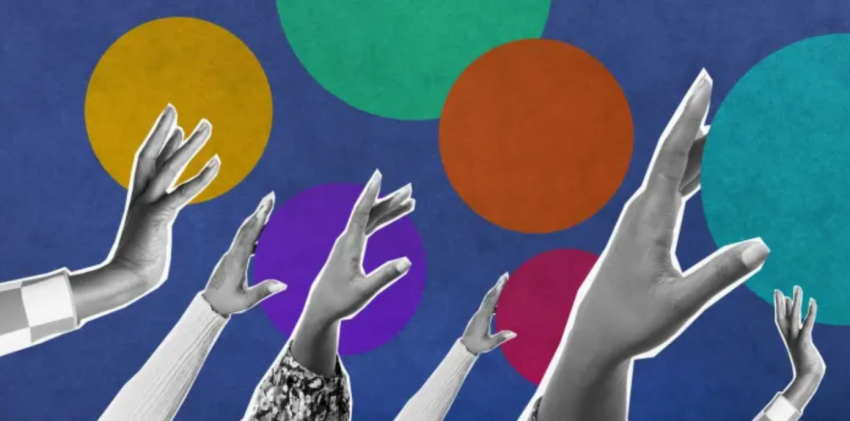Martha Baker is the best-selling author of “The Righteous Way” and host of the podcast “Confused.” This article first appeared in the March 2018 issue of O, The Oprah Magazine as “Easy Do It,” as part of a series. I found the first piece here.
When freelance writer and brand consultant Dixie Light needed to climb out of her slump and find her destiny, she asked O’s life coach Martha Baker to be her guide. Martha began advising her new clients to get in touch with their insides by taking deep breaths and paying attention to physical sensations. “If you pay attention to your body, you feel like your body is being pulled toward what works for you,” she says. “What makes you feel happy and relaxed?” Dixie admits that she loves fashion magazines and street style blogs that feature “women of a certain age dressing like me”. Aha! Following small pleasures is the way to your great purpose, our coach said, and he went on to give the 55-year-old New Yorker a homework assignment: Do only what you love. Has Dixie been pursuing her happiness? Let’s find out.
Martha Beck: Tell me how your life has been since we talked!
Dixie Wright: Well, I’ve taken some concrete steps. I found someone to help me develop a website and blog. I wanted to call it Girltown and write about old-fashioned heroines – from movies or real life – and my own experiences.
M: That’s huge!
DL: But that’s where my discipline problem comes in. I would say “I want to learn French!” So instead of signing up for a class, I bought a bunch of T-shirts with French words on them.
MB: You fall into a common pattern that people have a hard time finding solutions to. I call it “Having the courage to do small things.” This means taking tiny incremental turtle steps.
DL: Let’s talk about that. I’ve taped the cover of O to my bathroom mirror to remind me to work on my blog for an hour a day.
M: Oh, dear. An hour?
DL: Probably too long.
How much work did you do?
DL: zero.
MB: The reason is: you have too many steps. You’re an animal, and your motivational system works just like an animal system. But you’re trying to apply an analytical approach. You set a big goal, think you’re going to keep going, and the only motivation you need is this vague idea that one day you’re going to be great. But to train an animal, you need a high level of reinforcement for very small movements. To train a killer whale to jump out of the water, you first have to reward it for surfacing. If it doesn’t reach the surface, you reward it with four or five feet.
DL: When I tell myself I’m only going to write for 20 minutes, I usually start writing and then find it impossible to stop. But I have a Platonic ideal of what a blog should look like, and now that it’s time to actually do it, I’m afraid it will…
MB: I speak to you from experience: every time you sit down to write a paragraph, it’s rubbish compared to your fantasy. That’s why it takes courage to do small things. People would rather do 12 big things than follow through.
DL: I always seem to take the path of least resistance.
MB: I don’t think it’s taking the path of least resistance. Your response is not effort. Is fear. It’s the fear of self-loathing, when you see yourself doing a little thing and tell yourself how pathetic it is.
DL: There’s no reason to think I’m going to fail. I’ve never failed at anything I’ve tried.
MB: Not in the outside world. But in your mind, you’re constantly creating stories about yourself that are more powerful than anything we might call objective reality. People look for evidence to support what they already believe, and they can construct it with gossamer. One time, I was leading a seminar where everyone was working with horses, and I said to a woman, “Were you an athlete in college? You are so elegant.” She was angry all day and finally suddenly said, “I was fine until you started screaming that I should exercise more!” I knew you’d say something cruel!”
DL: I worry that I’m not up to it, and it’s scary to put myself in situations that might turn out to be right.
MB: We create our mental distress by creating these narratives – comparing ourselves to others, or comparing our performance to what we think we are performing. Buddhists believe that a comparison mentality is one of the biggest sources of suffering. Animals don’t do that. When a beaver builds a dam, he doesn’t think about whether it is as great as other DAMS. He’s been building.
DL: You must have hit a nerve, because I feel like I’m going to cry.
Dear, the essential self often cries when it finds itself understood. I could sit here all day and tell you how amazing I think you are – and I do, by the way – but it wouldn’t break your own mind-set. What helps is to start thinking of yourself as part of a brain, but primarily an animal. When you attack yourself because you’re not good enough, you’re giving an animal an electric shock. We talked about treating ourselves like pets. What happens to your body when you think about them suffering?
DL: Well, I didn’t do that part of the homework – just sit still and feel my body sensations. I’d rather do 50 push-ups.
MB: Listening to your body is still the most powerful thing you can do to change your life – but if you don’t, that means it’s too big a step. I have two goals before our next meeting. First, I want you to start noticing how your body feels when you do something beneficial, even if it’s just petting your dog. The second thing is to find a little turtle step that you can do every day. You said that writing for 20 minutes builds your motivation. Try it for ten minutes. What you write may be stupid and awful – in fact, write “This is stupid and awful” at the top of the page – but do it. When do you have the most energy?
DL: in the morning.
MB: So sit down first thing in the morning. By day 4, you might want to skip it, but keep going, because in my experience, that’s when the brain starts thinking, oh, I’m doing this at this time every day. Set a timer for ten minutes, and when it goes off, stop and give yourself a treat. I like a cup of Rooibos tea.
DL: Maybe I should wait ten minutes for my coffee.
Don’t rob the animal of anything. We’re not taking anything. We added rewards. If you do, something strange will happen. You find yourself complaining and pleading for more to be done.
DL: What if I want to keep going longer than 10 minutes?
M: no. You have to stop after ten minutes, because if you lie to it, it won’t trust you. If it does what you ask it to do, bravely and proudly for ten minutes, and then you don’t give it a break and reward, it will feel betrayed and stop working for you. If you get excited and want to keep writing, you can always come back later in the day. But for now, you want to motivate your animal self with routines and rewards until you become obsessed with the activity.
DL: Well, I’ll try. You are very kind. Martha, if you’re ever in New York, let me put some jewelry on you!
[Laughs] I live in the woods in my pajamas. Seriously, if you do what you did for 10 minutes, that will be the best reward you can give me.




